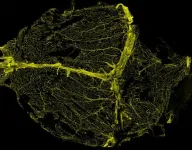(Press-News.org) About 20 % of patients whose medical records showed them as being alive with a serious illness were in fact deceased according to California data, leading to hundreds of unnecessary interactions such as appointment reminders, prescription refills and other kinds of wasteful outreach that strain resources and healthcare workers’ time.
The data gap is due to California law that makes these full death data available only “for purposes of law enforcement or preventing fraud,” according to a UCLA-lead research team. Even a real-time death database maintained by the National Association for Public Health Statistics and Information Services remains unavailable to health organizations, they write.
The findings will be published Dec. 4 in a JAMA Internal Medicine research letter.
The problem exists for nearly all California hospitals and in some other states, but the UCLA team is the first to document it, said Dr. Neil Wenger, professor of medicine in the division of general internal medicine and health services research at the David Geffen School of Medicine at UCLA and the paper’s lead author.
“The amazing thing is that this is an easily solvable problem because the state has a database that can identify most of the patients who die, but current law prevents them from giving it to health care institutions; only financial institutions,” Wenger said. “Perhaps highlighting this problem will raise awareness and help to fix this issue.”
The researchers tracked 11,698 seriously ill patients aged 18 years and older across 41 UCLA Health clinics over two years or until November 2022, and compared those who were noted as being alive in the electronic health record against data in the California Department of Public Health Public Use Death File, a portion of which were than reviewed by hand. This file contains information such as name, sex and birthdate, but not social security number, which is available only for fraud prevention.
Patient encounters included letters, notes, orders, portal messages, telephone outreach, appointments and refills that occurred after death until Dec. 19, 2022.
Of the patients tracked, 2,920 were correctly noted as deceased in their health records but another 676 who were believed to be alive based on their records were in fact deceased according to the California data.
Of those found to be deceased 541 had an encounter or appointment still pending:. In addition:
221 received 920 letters about preventative care such as flu shots or cancer screenings
166 received 226 mailed correspondence
158 had 184 orders placed for vaccines and other care
88 medications were authorized
310 appointments were still active for 145 deceased patients
Follow up extended for an average of 19 months.
“Not knowing who is dead hinders efficient health management, billing, advanced illness interventions and measurement,” they write. “It impedes the health system’s ability to learn from adverse outcomes, to implement quality improvement and to provide support for families.”
The findings may not be applicable to other health systems or states, the researchers note.
Co-authors are Fernando Javier Sanz Vidorreta, Michael Dudley, and Dr. Anne Walling of UCLA, and Dr. Michael Hogarth of UC San Diego. The research was funded by the Patient-Centered Outcomes Research Institute (PLC-1609-36291) and the Biomedical Informatics Program at UCLA CTSI, which is funded by the National Institutes of Health through the National Center for Advancing Translational Sciences (NCATS) Grant (#UL1TR001881).
END
About 20% of patients listed as alive in their electronic health records were actually deceased according to California data
The discrepancy leads to wasteful follow-up outreach; solution hampered by lack of data availability to healthcare systems
2023-12-04
ELSE PRESS RELEASES FROM THIS DATE:
Dietary environmental factors shape the immune defense against Cryptosporidium infection
2023-12-04
Francis Crick Institute press release
Under strict embargo: 16:00hrs GMT Monday 4 December 2023
Peer reviewed
Experimental study
Animals
Researchers at the Francis Crick Institute have discovered that a common dietary supplement could protect against chronic Cryptosporidium infections which are particularly prevalent in children under two and in areas with poorer sanitation.
Cryptosporidium is a parasite that infects and damages the small intestine. It is one of the leading causes of diarrhoea-related deaths ...
New study maps ketamine's effects on brain
2023-12-04
Ketamine – an anesthetic also known for its illicit use as a recreational drug – has undergone a thorough reputational rehabilitation in recent years as the medical establishment has begun to recognize its wide-ranging therapeutic effects. The drug is increasingly used for a range of medical purposes, including as a painkiller alternative to opioids, and as a therapy for treatment-resistant depression.
In a new study published in the journal Cell Reports, Columbia biologists and biomedical engineers mapped ketamine’s effects on the brains of mice, and found that repeated use over extended periods of time leads to widespread structural changes in the brain’s ...
Studies help explain why some prostate cancers become resistant to hormone therapy
2023-12-04
Two new studies led by researchers from the UCLA Jonsson Comprehensive Cancer Center give insight into how cells use energy to influence the way prostate tumors survive and grow — advancements that can help explain why some prostate cancers become resistant to hormone therapy, the most commonly used treatment for men with advanced stages of the disease.
Hormone therapy, also known as antiandrogen therapy, plays a crucial role in temporarily halting the growth of prostate cancer cells. Over time, however, the majority of patients eventually see their cancer return and progress, underscoring the pressing need for continued advancements to enhance clinical ...
Hard to drug: Protein droplets reveal new ways to inhibit transcription factors in an aggressive form of prostate cancer
2023-12-04
Many of the most potent human oncoproteins belong to a class of proteins called transcription factors, but designing small molecule drugs that target transcription factors is a major challenge.
An international team of researchers from the Institute for Research in Biomedicine (IRB Barcelona), the Max Planck Institute for Molecular Genetics (MPIMG), BC Cancer (University of British Columbia) and other institutions has discovered a potential way to target the androgen receptor, the most prominent oncogenic transcription factor in prostate cancer, based on its propensity to form droplets also known as condensates.
The results described ...
MD Anderson’s Katy Rezvani, M.D., receives 2023 Honorific Award from the American Society of Hematology
2023-12-04
Katy Rezvani, M.D., Ph.D., professor of Stem Cell Transplantation & Cellular Therapy at The University of Texas MD Anderson Cancer Center, has been honored with the E. Donnall Thomas Lecture and Prize from the American Society of Hematology (ASH) for her groundbreaking research to develop and advance innovative cell therapies for cancer using natural killer (NK) cells.
“I am fortunate to be able to engage in research that I am passionate about, to mentor incredible young scientists, and to collaborate with a remarkable team of researchers and clinicians. But most importantly, I am blessed to have the opportunity to undertake research that has the potential to ...
Salty immune cells surrounding the brain linked to hypertension-induced dementia
2023-12-04
A study supported by the National Institutes of Health suggests that the response of immune system cells inside the protective covering surrounding the brain may contribute to the cognitive decline that can occur in a person with chronic high blood pressure. This finding, published in Nature Neuroscience, may shed light on new ways to counteract the effects of high blood pressure on cognition. The study was funded by the National Institute of Neurological Disorders and Stroke (NINDS), a part of NIH.
“The role of immune signaling in cognitive decline is critically important to understand,” said Roderick Corriveau, Ph.D., program director, NINDS. “These findings offer insight ...
Dark galactic region nicknamed "The Brick" explained with Webb telescope findings
2023-12-04
In a recent study led by University of Florida astronomer Adam Ginsburg, groundbreaking findings shed light on a mysterious dark region at the center of the Milky Way. The turbulent gas cloud, playfully nicknamed “The Brick” due to its opacity, has sparked lively debates within the scientific community for years.
To decipher its secrets, Ginsburg and his research team, including UF graduate students Desmond Jeff, Savannah Gramze, and Alyssa Bulatek, turned to the James Webb Space Telescope (JWST). The implications of their observations, published in ...
Awareness, accessibility, and affordability are crucial for the early detection of thalassemia
2023-12-04
- Interviewing Dr. Androulla Eleftheriou, Executive Director at TIF, and Dr. Zhiyu Peng, Deputy GM at BGI Genomics, Head of the World Hemoglobinopathy Foundation
Thalassemia, a hereditary hemoglobinopathy, occurs in 4.4 out of every 10,000 live births and is prevalent in Mediterranean coastal areas, Africa, the Middle East, Southeast Asia, and southern China.
Screening and antenatal diagnosis reduced the frequency of β-thalassemia in many Mediterranean countries. Focusing on other regions with high thalassemia prevalence, BGI Genomics has launched the Global 2023 State of Thalassemia Awareness Report, covering 1,847 ...
Complications from flu largely preventable with annual flu vaccine
2023-12-04
ARLINGTON, Va., BETHESDA, Md., CHICAGO and DALLAS, Dec. 4, 2023 — During National Influenza Vaccination Week (December 4-8, 2023), leading public health organizations are encouraging everyone to get a flu shot if they have not already done so. The flu is more than an inconvenience: it can lead to hospitalization, worsening of chronic medical conditions or even death. An annual flu vaccine is the best way to help prevent complications from the flu. [1]
The American Heart Association®, the American Lung Association,® the American ...
Soil drought weakens forest microclimatic cooling
2023-12-04
Scientists from Stockholm University have investigated the mechanisms that create cool microclimates beneath forest canopies during warm and dry summer days. The study reveals how canopy shading and water evaporation together create cooler forest microclimates compared to temperatures outside forests. The article is published in Agricultural and Forest Meteorology.
”The findings are alarming in the context of climate change as more frequent and more severe droughts may threaten the cooling functions of forests,” says Caroline Greiser, researcher at the Physical Geography Department, Stockholm ...
LAST 30 PRESS RELEASES:
Night lights can structure ecosystems
A parasitic origin for the ribosome?
A gold-standard survey of the American mood
Tool for identifying children at risk of speech disorders
How Japanese medical trainees view artificial intelligence in medicine
MambaAlign fusion framework for detecting defects missed by inspection systems
Children born with upper limb difference show the incredible adaptability of the young brain
How bacteria can reclaim lost energy, nutrients, and clean water from wastewater
Fast-paced lives demand faster vision: ecology shapes how “quickly” animals see time
Global warming and heat stress risk close in on the Tour de France
New technology reveals hidden DNA scaffolding built before life ‘switches on’
New study reveals early healthy eating shapes lifelong brain health
Trashing cancer’s ‘undruggable’ proteins
Industrial research labs were invented in Europe but made the U.S. a tech superpower
Enzymes work as Maxwell's demon by using memory stored as motion
Methane’s missing emissions: The underestimated impact of small sources
Beating cancer by eating cancer
How sleep disruption impairs social memory: Oxytocin circuits reveal mechanisms and therapeutic opportunities
Natural compound from pomegranate leaves disrupts disease-causing amyloid
A depression treatment that once took eight weeks may work just as well in one
New study calls for personalized, tiered approach to postpartum care
The hidden breath of cities: Why we need to look closer at public fountains
Rewetting peatlands could unlock more effective carbon removal using biochar
Microplastics discovered in prostate tumors
ACES marks 150 years of the Morrow Plots, our nation's oldest research field
Physicists open door to future, hyper-efficient ‘orbitronic’ devices
$80 million supports research into exceptional longevity
Why the planet doesn’t dry out together: scientists solve a global climate puzzle
Global greening: The Earth’s green wave is shifting
You don't need to be very altruistic to stop an epidemic
[Press-News.org] About 20% of patients listed as alive in their electronic health records were actually deceased according to California dataThe discrepancy leads to wasteful follow-up outreach; solution hampered by lack of data availability to healthcare systems



